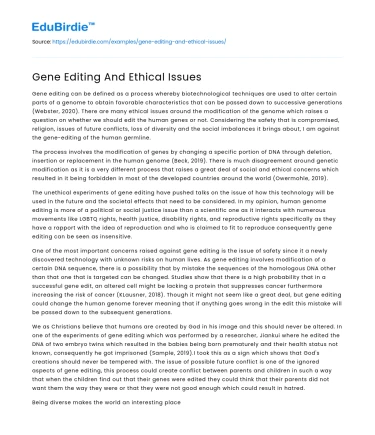Gene editing can be defined as a process whereby biotechnological techniques are used to alter certain parts of a genome to obtain favorable characteristics that can be passed down to successive generations (Webster, 2020). There are many ethical issues around the modification of the genome which raises a question on whether we should edit the human genes or not. Considering the safety that is compromised, religion, issues of future conflicts, loss of diversity and the social imbalances it brings about, I am against the gene-editing of the human germline.
The process involves the modification of genes by changing a specific portion of DNA through deletion, insertion or replacement in the human genome (Beck, 2019). There is much disagreement around genetic modification as it is a very different process that raises a great deal of social and ethical concerns which resulted in it being forbidden in most of the developed countries around the world (Owermohle, 2019).
Save your time!
We can take care of your essay
- Proper editing and formatting
- Free revision, title page, and bibliography
- Flexible prices and money-back guarantee
The unethical experiments of gene editing have pushed talks on the issue of how this technology will be used in the future and the societal effects that need to be considered. In my opinion, human genome editing is more of a political or social justice issue than a scientific one as it interacts with numerous movements like LGBTQ rights, health justice, disability rights, and reproductive rights specifically as they have a rapport with the idea of reproduction and who is claimed to fit to reproduce consequently gene editing can be seen as insensitive.
One of the most important concerns raised against gene editing is the issue of safety since it a newly discovered technology with unknown risks on human lives. As gene editing involves modification of a certain DNA sequence, there is a possibility that by mistake the sequences of the homologous DNA other than that one that is targeted can be changed. Studies show that there is a high probability that in a successful gene edit, an altered cell might be lacking a protein that suppresses cancer furthermore increasing the risk of cancer (KLausner, 2018). Though it might not seem like a great deal, but gene editing could change the human genome forever meaning that if anything goes wrong in the edit this mistake will be passed down to the subsequent generations.
We as Christians believe that humans are created by God in his image and this should never be altered. In one of the experiments of gene editing which was performed by a researcher, Jiankui where he edited the DNA of two embryo twins which resulted in the babies being born prematurely and their health status not known, consequently he got imprisoned (Sample, 2019).I took this as a sign which shows that God's creations should never be tempered with. The issue of possible future conflict is one of the ignored aspects of gene editing, this process could create conflict between parents and children in such a way that when the children find out that their genes were edited they could think that their parents did not want them the way they were or that they were not good enough which could result in hatred.
Being diverse makes the world an interesting place to live in, it makes the interactions that you have with different people more exciting but imagine if every human's genes were edited. People would similarly respond to the environment, as a result, they would not take interest in getting to know each other and there will be no beauty of diversity around the world consequently making the world a dull place to be in.
Then again, the process of gene editing is quite a costly one meaning that it cannot be even in the society which will result in two different systems of humanity as well as health care. Affording families would be able to edit and get rid of the imperfections but it would be expensive for most people in the developing countries. This classification would result in diseases being cured in developed countries than in developing countries worsening separation around the world.
Gene editing is known to cure diseases consequently bringing immediate relief to long term suffering and the genes can be edited in such a way that life expectancy is extended (Niglia, 2019) but there are very slim chances that it could be successful in eliminating the diseases and according to MedicalNewsToday it might lead to the development of other diseases such as cancer which can in the worst-case scenario lead to death (Cohut, 2018). The smallest mistake that is made during the process will be carried down to the successive generations and there will be no going back.
Gene editing should not be considered because, the safety of human life is compromised, religion is tempered with, the possibility of future conflicts, loss of diversity and the social imbalances it brings about. The process might have a pessimistic impact on the subsequent generations. The offspring is not given the right to choose their condition and the practical understanding of the subject might be the loss of prosperity in the biblical teachings. There is little to no possibility that the nation might find balance in the scientific and religious considerations nor the effect of gene editing consequently we will always face a dead end.
References
- Beck, K. (2019, May 28). Gene Modification: Definition, Types, Process, Examples.
- Cohut, M. (2018, June 12). Gene editing for cancer prevention might cause cancer.
- KLausner, A. (2018, July 12). Futuristic gene editing might cause cancer.
- Niglia, S. (2019, January 01). Gene editing pros and cons. South Africa.
- Sample, I. (2019, December 30). Chinese scientist who edited babies' genes jailed for 3 years. China.
- Webster, M. (2020, March 3). Gene editing.






 Stuck on your essay?
Stuck on your essay?

